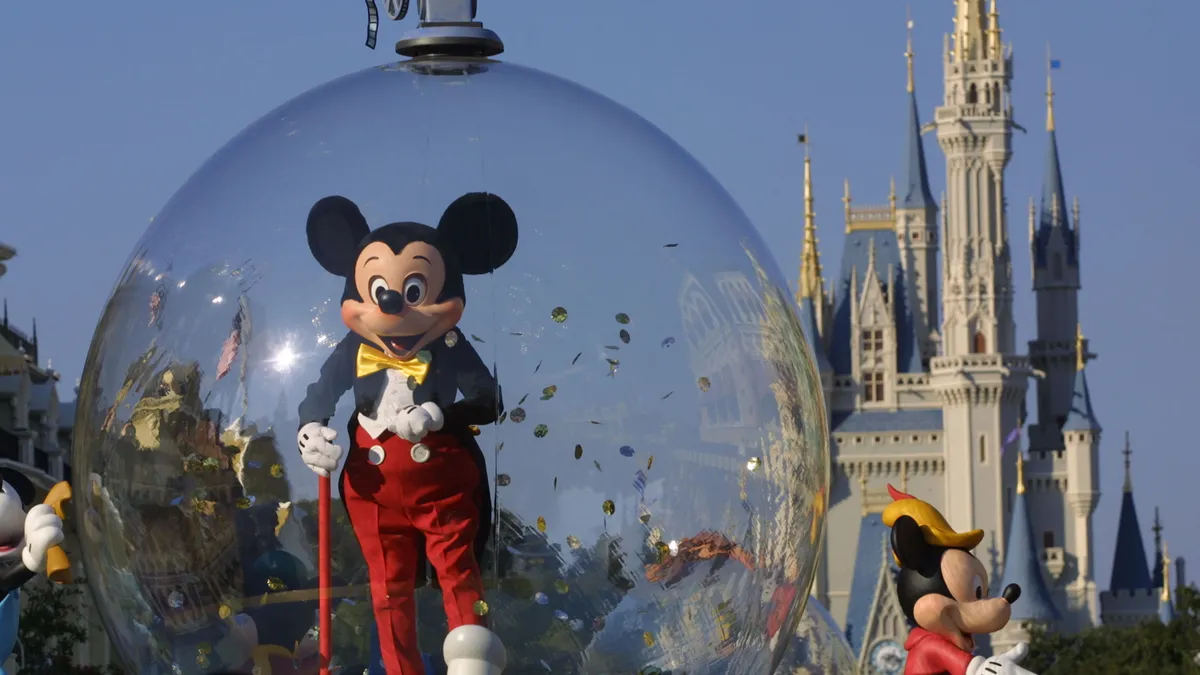Dive Brief:
- The Walt Disney Company will be reducing the content on its streaming platforms as part of a shift in its strategic approach to content creation, CFO Christine McCarthy said Wednesday during the company’s second quarter earnings call.
- The decision builds on a restructuring plan announced in the company’s first quarter, where newly returned CEO Bob Iger and McCarthy pitched a renewed focus on the company’s streaming content following a slump in subscribers. Paid subscribers for the Burbank, Calif.-based company’s Disney+ streaming platform dipped for the second consecutive quarter by approximately four million, according to the company’s most recent earnings results.
- “Going forward, we intend to produce lower volumes of content in alignment with this strategic shift,” McCarthy said of the company’s restructuring plans.
Dive Insight:
Total subscribers reached 157.8 million for the quarter ending April 1, a 2% drop from the 161.8 million reported in December.
However, Disney also narrowed its streaming loss, reporting a net loss in its direct-to-consumer segment of $669 million, according to its earnings results. This is a 26% improvement from the $887 million net loss it reported last year during this same period and comes after large-scale layoffs as Disney looks to execute on a plan to cut costs.
Disney took a $150 million charge in its second quarter, primarily related to severance costs, McCarthy said Wednesday. During its first quarter earnings in February, the company announced it would be cutting 3.6% of its workforce — about 7,000 jobs — as part of its restructuring plan, aimed at “returning power to creative executives,” as well as reducing costs, Iger said.
In April, Disney also took steps to reorganize its finance team according to a memo sent by McCarthy to employees, in order to provide “strong financial and strategic support” to its creative and distribution teams, she said. This came on the tail end of further layoffs, including the reduction of its entertainment division staff by 15%.
The company is “making excellent progress on our cost-cutting initiatives and are on track to meet or exceed the efficiency targets we outlined last quarter,” McCarthy said on the second quarter earnings call. Disney expects to see an additional $180 million in additional severance charges through the remainder of its fiscal year, she said. The company remains “confident in our long-term trajectory,” she said.
As well as changes to how it is approaching streaming content, Disney is also grappling with other looming challenges to its business model including its ongoing legal battle with Florida Governor Ron DeSantis and the potential of artificial intelligence technologies.
Disney has tussled with the Florida governor over the state’s controversial “Don’t Say Gay” bill, which has morphed into a legal challenge surrounding its special tax district in the state. In late April, the company extended its federal lawsuit against the governor, accusing DeSantis of a “campaign to weaponize government power,” according to a report by CNBC.
Iger — who slid back into the Mouse House’s top executive chair last year after McCarthy expressed a lack of confidence in his replacement — noted this was “plainly a matter of retaliation” by the governor on Wednesdays’ earnings call. Disney is far from the only company operating a special district within the state, he said, and noted “there was no concerted effort to do anything to dismantle what was once called Reedy Creek Special District until we spoke out on the legislation.”
Iger also noted the business is Florida’s largest taxpayer — having paid over $1.1 billion in local and state taxes alone in 2022 — as well as an employer of 75,000 people and a prime driver of tourism and investment in the state. He pointed to Disney’s plans to invest $17 billion over the next decade, “which is what the state should want us to do,” he said.
“Does the state want us to invest more, employ more people, and pay more taxes, or not?” he said.
Meanwhile, as questions over streaming content and the potential impact of the writer’s strike rise, Iger also pointed to the potential of AI, noting it could provide some “great opportunities” for Disney to get closer to its customers.
However, it’s also clear that the technology “is going to be highly disruptive, and it could be extremely difficult to manage, particularly from an IP management perspective,” he said during the earnings call.
Issues over AI, copyright and intellectual property rights have already reared their heads during the ongoing Writers Guild of America strike, with the WGA proposing regulations surrounding the use of AI-generated material that would protect writers’ rights as well as looking to prohibit AI from being used as source material.
Overall, Iger was bullish on AI’s potential, while adding that “there's a lot we're going to have to contend with that will be quite disruptive and quite challenging.”












